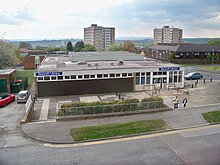Library
This article does not have any sources. (December 2017) |

A library is a place where many books are kept. Most libraries are public and let people take the books to use in their home. Most libraries let people borrow books for several weeks. Some belong to institutions, for example, companies, churches, schools, and universities. The people who work in libraries are librarians. Librarians are people who take care of the library.
Other libraries keep famous or rare books. There are a few "Copyright libraries" which have a copy of every book which has been written in that country. Some libraries also have other things that people might like, such as magazines, music on CDs, or computers where people can use the Internet. In school they offer software to learn the alphabet and other details.

With the spread of literacy, libraries have become essential tools for learning. Libraries are very important for the progress and development of a society. Libraries are collections of books and other informational materials, however a library can also be a collection of items or media. People come to libraries for reading, study or reference. Libraries contain a variety of materials. They contain printed materials, films, sound and video recordings, maps, photographs, computer software, online databases, and other media.
A library is not a bookstore (a store that sells books).
Importance of a Library[change | change source]
The prime purpose of a library is to provide access to knowledge and information. To fulfil this mission, libraries preserve a valuable record of culture. Then they pass down this to the coming generations. Therefore, they are an essential link between the past, present and future.
People use libraries to work. They also use library resources to learn about personal interests. Sometimes, they get recreational media such as films and music. Students use libraries to study.
Libraries help the students to develop good reading and study habits. Public officials use libraries for research and public issues. The libraries provide information and services that are essential for learning and progress.
Public libraries[change | change source]

Many places have a public library, where anybody can join if they live in the area. With a library card, people can borrow books and take them home for several weeks. It does not cost money to get a library card at most public libraries.
Books are kept on shelves in a special order so they are easy to find. Public libraries have lot of books on various topics including story books and many others. Many public libraries have books and CDs about learning English. Stories are kept in alphabetical order by the last name of the person who wrote them, the writer. Books about other things are often given a special number, that refers to what they are about. They are then put on the shelf in number order. One number system used by many libraries is the Dewey decimal system.
Mobile libraries[change | change source]

In rural areas books may be taken in a bookmobile, or mobile library to remote places.[1]
Academic libraries[change | change source]
Many colleges and universities have large academic libraries. These libraries are for the use of college students, professors, and researchers. Academic libraries are used mainly for doing research like studying the solar system or how earthquakes happen. These libraries do not have the same types of books you would find in a public library. They usually do not have fiction books or books for children (unless they are being studied). Academic libraries can have many books, sometimes more than a million.
Special libraries[change | change source]
Special libraries are those libraries that are not public libraries or academic libraries. They are usually small. Many times a special library holds books on a particular subject or even a special kind of book. Some special libraries keep just old books or books by Shakespeare. A special library can be owned by a business for use only by that business. For example, Disney World in Orlando has its own library that is not open to the public but for the use of the people who work for the company.
Librarians[change | change source]
A librarian is a person who works in a library. Librarians help people find books and information. They can teach people how to find books and use the library. A professional librarian is a person who went to school to study library science. They can earn a degree called a Masters in Library Science.
History[change | change source]
The earliest known library was discovered in Iraq and belonged to the ancient civilization in Sumer. They didn't use paper books but instead wrote everything on clay tablets using a style of writing called cuneiform. These tablets are over 5,000 years old. The Library of Alexandria, in Egypt, was the largest and most important library of the ancient world. It was destroyed when the Romans conquered Egypt in 30 BC. Rome’s first public library was established by Asinius Pollio who was a lieutenant of Julius Caesar. Eventually Rome would build 28 public libraries within the city. When the Roman Empire fell in 330 AD, many books went east to the city of Byzantium where a large library was built. Other libraries were built in monasteries and public homes.
Libraries began to appear in many Islamic cities, where science and philosophy survived after the fall of the Roman Empire. Christian monks and Islamic libraries exchanged books to copy.
Recent times[change | change source]
COVID-19 pandemic has further changed how libraries operate in year 2020 and many of them around the world were faced with really hard choices as to which services to offer and which services to shut down for a limited time.
Related pages[change | change source]
References[change | change source]
- ↑ Magazine, Smithsonian; Eveleth, Rose. "The Earliest Libraries-on-Wheels Looked Way Cooler Than Today's Bookmobiles". Smithsonian Magazine. Archived from the original on 2014-05-18. Retrieved 2023-03-04.
